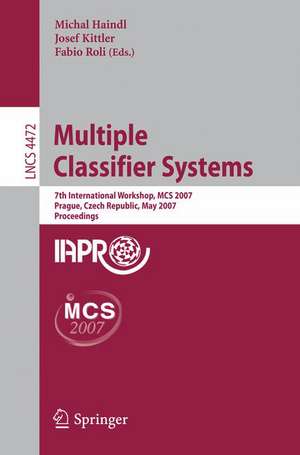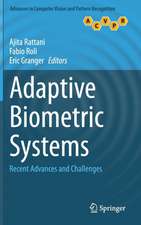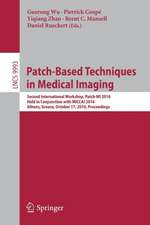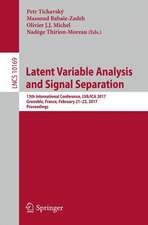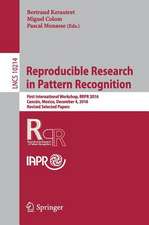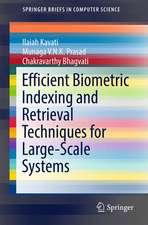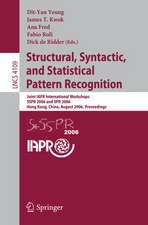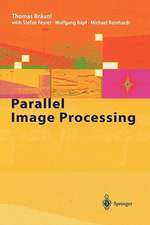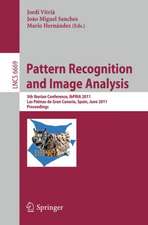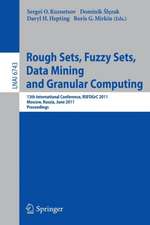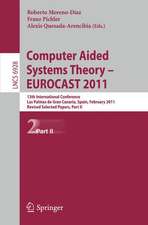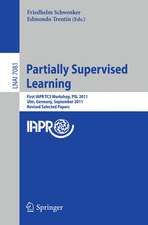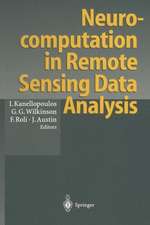Multiple Classifier Systems: 7th International Workshop, MCS 2007, Prague, Czech Republic, May 23-25, 2007, Proceedings: Lecture Notes in Computer Science, cartea 4472
Editat de Michal Haindl, Josef Kittler, Fabio Rolien Limba Engleză Paperback – 9 mai 2007
Din seria Lecture Notes in Computer Science
- 20%
 Preț: 1061.55 lei
Preț: 1061.55 lei - 20%
 Preț: 307.71 lei
Preț: 307.71 lei - 20%
 Preț: 438.69 lei
Preț: 438.69 lei - 20%
 Preț: 579.30 lei
Preț: 579.30 lei -
 Preț: 410.88 lei
Preț: 410.88 lei - 17%
 Preț: 427.22 lei
Preț: 427.22 lei - 20%
 Preț: 596.46 lei
Preț: 596.46 lei - 15%
 Preț: 448.04 lei
Preț: 448.04 lei - 20%
 Preț: 353.50 lei
Preț: 353.50 lei -
 Preț: 389.49 lei
Preț: 389.49 lei - 20%
 Preț: 309.90 lei
Preț: 309.90 lei - 20%
 Preț: 645.28 lei
Preț: 645.28 lei - 20%
 Preț: 763.23 lei
Preț: 763.23 lei - 15%
 Preț: 580.46 lei
Preț: 580.46 lei - 20%
 Preț: 310.28 lei
Preț: 310.28 lei - 20%
 Preț: 655.02 lei
Preț: 655.02 lei - 20%
 Preț: 1183.14 lei
Preț: 1183.14 lei - 20%
 Preț: 340.32 lei
Preț: 340.32 lei -
 Preț: 449.57 lei
Preț: 449.57 lei - 20%
 Preț: 591.51 lei
Preț: 591.51 lei - 18%
 Preț: 938.83 lei
Preț: 938.83 lei - 20%
 Preț: 337.00 lei
Preț: 337.00 lei - 20%
 Preț: 649.50 lei
Preț: 649.50 lei - 20%
 Preț: 607.40 lei
Preț: 607.40 lei - 20%
 Preț: 1414.79 lei
Preț: 1414.79 lei - 20%
 Preț: 1024.44 lei
Preț: 1024.44 lei - 20%
 Preț: 583.40 lei
Preț: 583.40 lei - 20%
 Preț: 453.32 lei
Preț: 453.32 lei - 20%
 Preț: 575.49 lei
Preț: 575.49 lei - 20%
 Preț: 1075.26 lei
Preț: 1075.26 lei - 20%
 Preț: 585.88 lei
Preț: 585.88 lei - 20%
 Preț: 825.93 lei
Preț: 825.93 lei - 17%
 Preț: 360.20 lei
Preț: 360.20 lei - 20%
 Preț: 763.23 lei
Preț: 763.23 lei - 20%
 Preț: 340.32 lei
Preț: 340.32 lei - 20%
 Preț: 504.58 lei
Preț: 504.58 lei - 20%
 Preț: 369.13 lei
Preț: 369.13 lei - 20%
 Preț: 580.93 lei
Preț: 580.93 lei - 20%
 Preț: 343.62 lei
Preț: 343.62 lei - 20%
 Preț: 350.21 lei
Preț: 350.21 lei - 20%
 Preț: 583.40 lei
Preț: 583.40 lei - 20%
 Preț: 583.40 lei
Preț: 583.40 lei - 15%
 Preț: 438.59 lei
Preț: 438.59 lei - 20%
 Preț: 341.95 lei
Preț: 341.95 lei - 20%
 Preț: 238.01 lei
Preț: 238.01 lei - 20%
 Preț: 538.30 lei
Preț: 538.30 lei
Preț: 346.75 lei
Preț vechi: 433.44 lei
-20% Nou
Puncte Express: 520
Preț estimativ în valută:
66.36€ • 72.06$ • 55.74£
66.36€ • 72.06$ • 55.74£
Carte tipărită la comandă
Livrare economică 22 aprilie-06 mai
Preluare comenzi: 021 569.72.76
Specificații
ISBN-13: 9783540724810
ISBN-10: 3540724818
Pagini: 540
Ilustrații: XI, 524 p.
Dimensiuni: 155 x 235 x 28 mm
Greutate: 0.81 kg
Ediția:2007
Editura: Springer Berlin, Heidelberg
Colecția Springer
Seriile Lecture Notes in Computer Science, Image Processing, Computer Vision, Pattern Recognition, and Graphics
Locul publicării:Berlin, Heidelberg, Germany
ISBN-10: 3540724818
Pagini: 540
Ilustrații: XI, 524 p.
Dimensiuni: 155 x 235 x 28 mm
Greutate: 0.81 kg
Ediția:2007
Editura: Springer Berlin, Heidelberg
Colecția Springer
Seriile Lecture Notes in Computer Science, Image Processing, Computer Vision, Pattern Recognition, and Graphics
Locul publicării:Berlin, Heidelberg, Germany
Public țintă
ResearchCuprins
Kernel-Based Fusion.- Combining Pattern Recognition Modalities at the Sensor Level Via Kernel Fusion.- The Neutral Point Method for Kernel-Based Combination of Disjoint Training Data in Multi-modal Pattern Recognition.- Kernel Combination Versus Classifier Combination.- Deriving the Kernel from Training Data.- Applications.- On the Application of SVM-Ensembles Based on Adapted Random Subspace Sampling for Automatic Classification of NMR Data.- A New HMM-Based Ensemble Generation Method for Numeral Recognition.- Classifiers Fusion in Recognition of Wheat Varieties.- Multiple Classifier Methods for Offline Handwritten Text Line Recognition.- Applying Data Fusion Methods to Passage Retrieval in QAS.- A Co-training Approach for Time Series Prediction with Missing Data.- An Improved Random Subspace Method and Its Application to EEG Signal Classification.- Ensemble Learning Methods for Classifying EEG Signals.- Confidence Based Gating of Colour Features for Face Authentication.- View-Based Eigenspaces with Mixture of Experts for View-Independent Face Recognition.- Fusion of Support Vector Classifiers for Parallel Gabor Methods Applied to Face Verification.- Serial Fusion of Fingerprint and Face Matchers.- Boosting.- Boosting Lite – Handling Larger Datasets and Slower Base Classifiers.- Information Theoretic Combination of Classifiers with Application to AdaBoost.- Interactive Boosting for Image Classification.- Cluster and Graph Ensembles.- Group-Induced Vector Spaces.- Selecting Diversifying Heuristics for Cluster Ensembles.- Unsupervised Texture Segmentation Using Multiple Segmenters Strategy.- Classifier Ensembles for Vector Space Embedding of Graphs.- Cascading for Nominal Data.- Feature Subspace Ensembles.- A Combination of Sample Subsets and Feature Subsets inOne-Against-Other Classifiers.- Random Feature Subset Selection for Ensemble Based Classification of Data with Missing Features.- Feature Subspace Ensembles: A Parallel Classifier Combination Scheme Using Feature Selection.- Stopping Criteria for Ensemble-Based Feature Selection.- Multiple Classifier System Theory.- On Rejecting Unreliably Classified Patterns.- Bayesian Analysis of Linear Combiners.- Applying Pairwise Fusion Matrix on Fusion Functions for Classifier Combination.- Modelling Multiple-Classifier Relationships Using Bayesian Belief Networks.- Classifier Combining Rules Under Independence Assumptions.- Embedding Reject Option in ECOC Through LDPC Codes.- Intramodal and Multimodal Fusion of Biometric Experts.- On Combination of Face Authentication Experts by a Mixture of Quality Dependent Fusion Classifiers.- Index Driven Combination of Multiple Biometric Experts for AUC Maximisation.- Q???stack: Uni- and Multimodal Classifier Stacking with Quality Measures.- Reliability-Based Voting Schemes Using Modality-Independent Features in Multi-classifier Biometric Authentication.- Optimal Classifier Combination Rules for Verification and Identification Systems.- Majority Voting.- Exploiting Diversity in Ensembles: Improving the Performance on Unbalanced Datasets.- On the Diversity-Performance Relationship for Majority Voting in Classifier Ensembles.- Hierarchical Behavior Knowledge Space.- Ensemble Learning.- A New Dynamic Ensemble Selection Method for Numeral Recognition.- Ensemble Learning in Linearly Combined Classifiers Via Negative Correlation.- Naïve Bayes Ensembles with a Random Oracle.- An Experimental Study on Rotation Forest Ensembles.- Cooperative Coevolutionary Ensemble Learning.- Robust Inference in Bayesian Networks with Application to GeneExpression Temporal Data.- An Ensemble Approach for Incremental Learning in Nonstationary Environments.- Invited Papers.- Multiple Classifier Systems in Remote Sensing: From Basics to Recent Developments.- Biometric Person Authentication Is a Multiple Classifier Problem.
